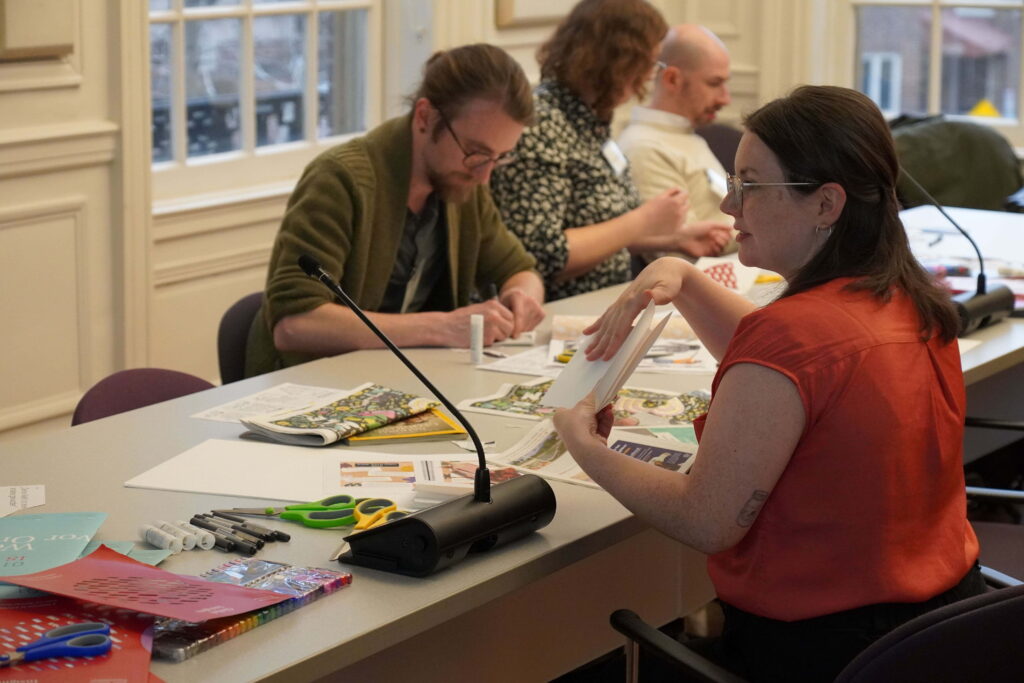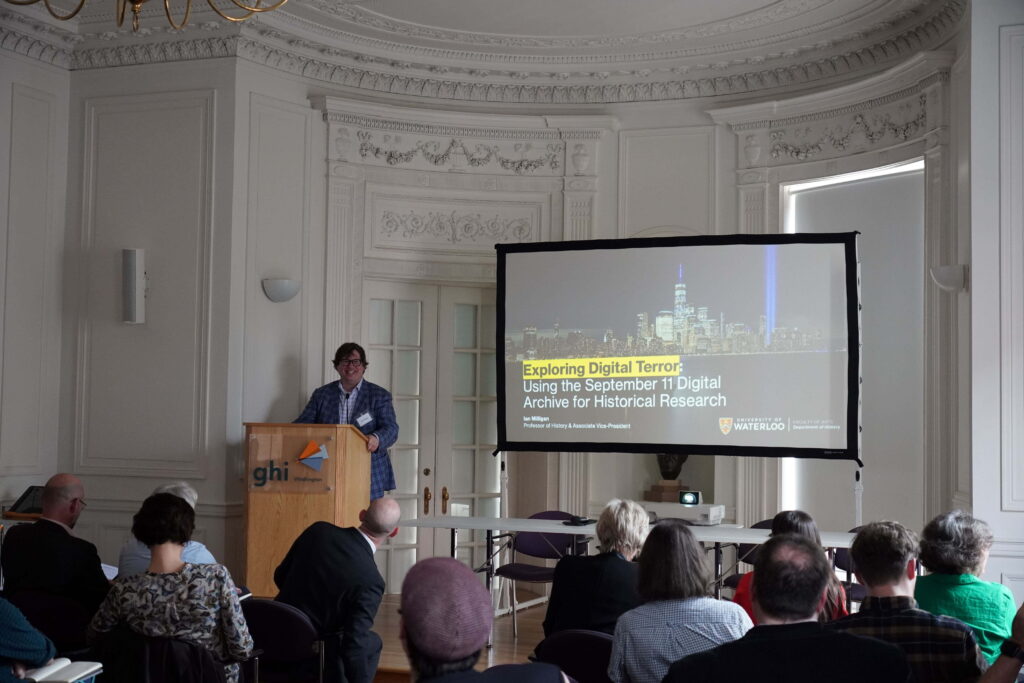Report from the Seventh Conference on Digital Humanities and Digital History
From March 19th to March 21st, 2025, the German Historical Institute (GHI) in Washington, DC hosted the Seventh Conference on Digital Humanities and Digital History. The conference theme, real-time history, drew on Roy Rosenzweig’s call to action that historians need to directly address the methodological potential and risks of the digital age.
Designed as a forum, the conference prompted attendees to share what opportunities, problems, and concerns arise while “documenting the now.” To allow space for unstructured creativity after long days of conferencing, the GHI team and I also arranged a zine-making workshop in which attendees crafted and exhibited their own mini magazines (just for fun!). As a first-time attendee to the DH conference, I was especially struck by how each presenter chose and justified different methodologies to achieve their project goals. The self-management evident in the still-emerging field reminded me of a Do-It-Yourself ethos usually applied to art and music. Scholars, practitioners, and activists discussed the following topics while sharing their experiences tackling real-time archiving.
Temporality – Wide Ranges of Real-Time History Production
The time between fact creation, archiving, construction of narratives, and assigning retrospective significance (to paraphrase Michel-Rolph Trouillot) looked different in each case study presented.
Internet historian Ian Milligan, in his research using RRCHNM’s September 11th Digital Archive, can trace public sentiment on September 11th by the minute. In LaShawnDa Pittman’s oral history work, community displacement driven by climate change and gentrification lends urgency to her efforts to collect Black grandmothers’ stories. Human rights lawyer Sapir Sluzker Amran wants to collect protest images as close to real-time as she can get: the Ezrahion archive encourages anti-war activists in Israel-Palestine to upload pictures “on the bus ride home” from protests. For Adteola Elizabeth Umoh, a single recorded memory breaks years of silence for people living with HIV. In his metanarrative about living archives, Christian Wachter led a discussion about temporalities and chronoception (an individual’s perception of the passage of time).
Ethics – Shared Concerns Complicated by the Internet and Borders
With participants working in various countries, including Brazil, Ukraine, Switzerland, and Australia, it became quickly apparent that regulations regarding privacy, ethics, review committees, and data management have unfolded unevenly across different universities and nations.
A prominent topic was the unwitting research subject whose social media, emails, text messages, or forum comments were scraped by researchers or otherwise uploaded to collections. Milligan shared that he could – with little effort – find the identity of those posting hate speech on and after 9/11. European-based scholars wondered what the privacy expectations were for group text chains while evaluating the spread of wartime dis/misinformation on the messaging platform Telegram. While scholars shared their approaches to privacy, few fundamental solutions were reached on this concern.
Former RRCHNM Director of Strategic Initiatives Sheila Brennan recommended that attendees looking for guidance consult the Association of Internet Researchers’ ethics guidelines.
Methods – Considering Context & Making Priorities Clear
When faced with questions from audience members who had approached their own work differently, it became clear that methods were strongly dictated by context and priorities.
A supportive institution in one country may be an unsafe institution in another. The Brazilian Coronarquivo, for instance, collected indigenous experiences during Covid-19 that may implicate government actions for possible negligence, leading to a guardedness by the creators towards state funding. As a media scholar, Bella Ruhl cautioned against mass open access to collections’ images without interpretation because decontextualized photos were found to circulate in online forums as “proof” of invented historical narratives. For some researchers, soliciting documentation during crises caused them to lower the barrier of entry for donors by deprioritizing the collection of metadata, despite knowing that metadata facilitates future archive use.
Motivation – Why Take on the Challenges of Real-Time History?
Those gathered in the conference were highly aware that their real-time history, digital history, and archival work shapes narratives, donors’ lives, and the historical record.
Regarding their motivations, some attendees asserted the necessity of anti-colonial practice through participatory action research. Others stated their motivation to build histories where gaps exist. Many were interested in capturing information that is prone, for whatever reason, to deletion. “What happens if I don’t have funding?” one researcher pondered in his presentation, to which he responded, “I’ll keep doing it.” Thorsten Hiltmann, like Roy Rosenzweig, also re-emphasized that our culture’s immersion into digitality, in which data is readily available, highly valued, and shapes our everyday, must continue to be examined using the tools at our fingertips.
As one of the few US-Americans in the room, the motivations and triumphs of my international peers was encouraging. As the conference opened Thursday morning with a workshop on the Internet Archive by Karl Blumenthal, the Trump administration announced the defunding of the Institute of Museum and Library Services (IMLS) – a major sponsor of the Internet Archive. We have since seen rapid efforts to preserve digital projects in the wake of defunding federal US humanities and history organizations.
Main Takeaway – Write Process Papers!
Many more topics were covered during the conference, including Ancestry.com use, trauma-informed archiving, hyper-realistic avatars, and developing historical questions from internet archives. One major conclusion was settled upon: if you want your archive to be usable, produce and regularly update a process paper.
State-sanctioned material archives from the modern period had a predetermined “how” and “why” to their operations based on nationalism and ivory-tower methods. Real-time archives in the digital era cannot be assumed to follow this prescription. A process paper will translate the DIY archives – containing all of these various temporalities, ethics guidelines, methods, and motivations – by capturing decision-making at the time of creation.
_ _ _
Lauren Rever is the 2024/25 Gerda Henkel Digital History Fellow at the German Historical Institute and Roy Rosenzweig Center for History and New Media. A public historian, her current postdoctoral project is a spatial history of domestic school trips to Washington, D.C.
The Seventh Conference on Digital History and Digital Humanities was organized in partnership with the German Historical Institute, the Luxembourg Centre for Contemporary and Digital History, the Chair for Digital History at Humboldt University of Berlin, NFDI4Memory, the Herder Institute for Historical Research on East Central Europe, and the Roy Rosenzweig Center for History and New Media.


